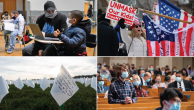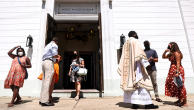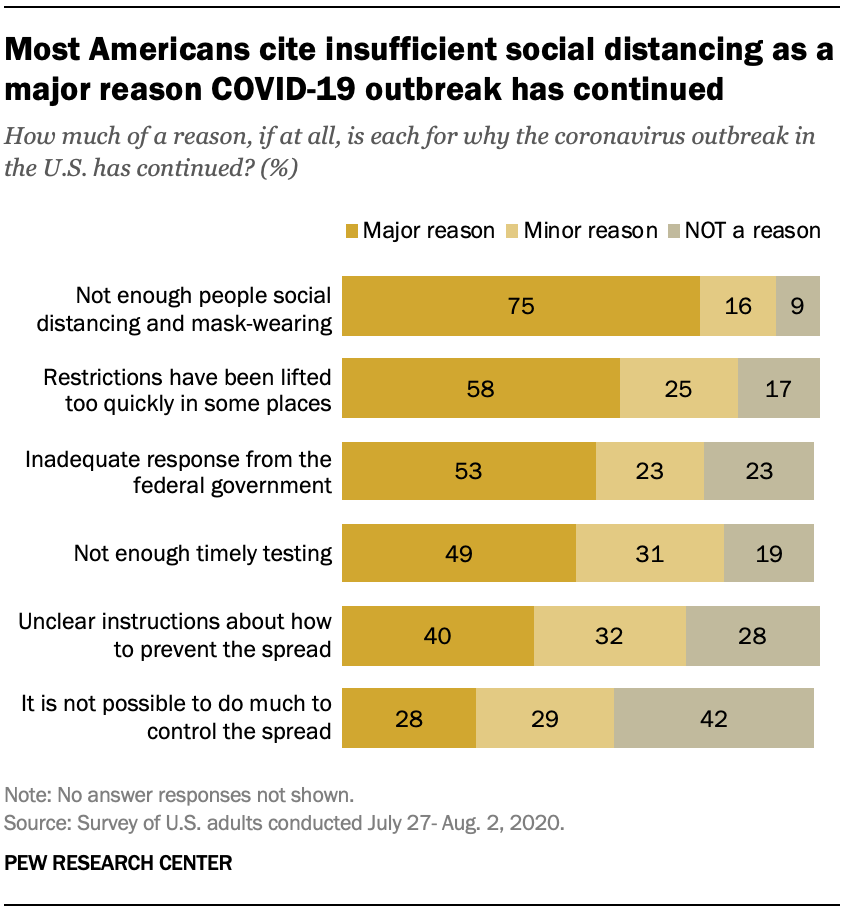
Three-quarters of Americans say that “not enough people following social distancing and mask-wearing guidelines” is a major reason the coronavirus outbreak has continued in the United States – the most commonly cited major reason among the six asked about in the survey. Roughly six-in-ten (58%) also say a major reason for the continued spread is that “restrictions on businesses and individuals have been lifted too quickly in some places.”
About half of Americans (53%) say an inadequate federal government response is a major reason for the continuation of the outbreak, while nearly as many (49%) point to a lack of timely testing. Four-in-ten say a lack of clarity in instructions for how to prevent the spread is a major reason it has continued. Just 28% of Americans say a major reason is that it is “not possible to do much to control the spread.”
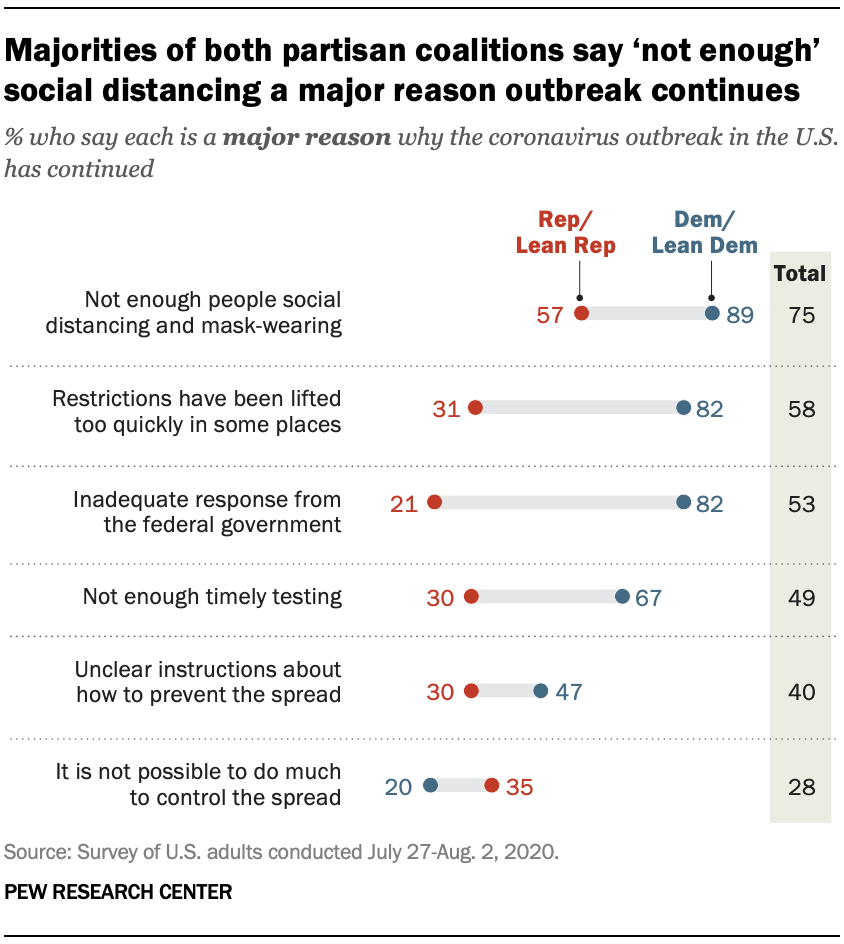
About nine-in-ten Democrats and Democratic-leaning independents say insufficient adherence to social-distancing and mask-wearing guidelines is a major reason for the continued coronavirus outbreak. This reason also tops the list among Republicans and GOP leaners of the six asked about in the survey, though a narrower majority (57%) considers this a major reason for the continued spread of the virus.
The partisan gap is widest on two other reasons: 82% of Democrats point to some places being too quick to ease restrictions as a major reason for the outbreak continuing, while just 31% of Republicans say this (about the same share of Republicans – 32% – say this is not at all a reason for the continuation of the outbreak). And while 82% of Democrats say an inadequate federal response is why COVID-19 has continued in the U.S., just 21% of Republicans say this (with nearly half – 45% – saying this is not a reason).
Two-thirds of Democrats also say “not enough timely testing” is a major reason for the coronavirus outbreak continuing in the U.S., while fewer than half as many Republicans (30%) say the same.
Republicans are more likely than Democrats to say a major reason for the outbreak continuing is that it isn’t possible to do much to control the spread; still, just 35% of Republicans and 20% of Democrats say this.
In a separate survey conducted earlier this summer, Republicans were more likely than Democrats to say the Chinese government’s initial handling of the outbreak was to blame “a great deal” for the global spread of the coronavirus (73% vs. 38%), though wide majorities in both parties (90% of Republicans, 74% of Democrats) said this.
Partisan divide over primary reason for rise in confirmed COVID-19 cases
By 60% to 39%, most Americans attribute the rise in confirmed coronavirus cases more to rising infections than to a rise in testing, with a wide partisan divide in these views.
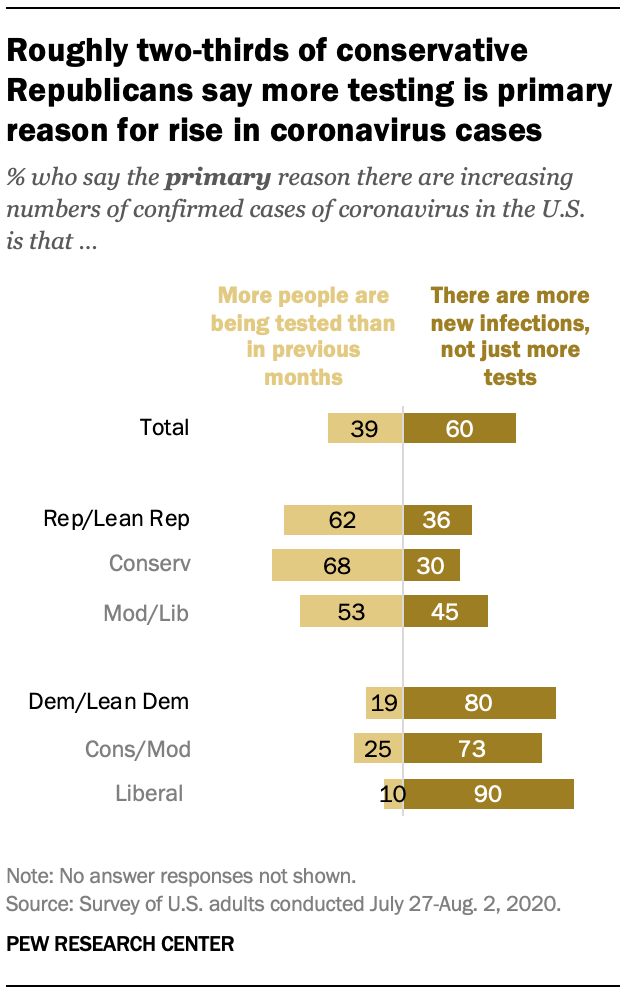
A 62% majority of Republicans say that “the increase in confirmed coronavirus cases is primarily a result of more people being tested than in previous months,” with 36% taking the view that “while more people are being tested compared with earlier in the outbreak, the increase in confirmed coronavirus cases is primarily because of more new infections, not just more tests.” About two-thirds of conservative Republicans attribute the growth in confirmed cases mostly to increased testing, while views among moderate and liberal Republicans are more divided (53% say it is mostly because of increased testing, 45% mostly because of increased infections).
By contrast, Democrats overwhelmingly hold the view that increased case counts are mainly the result of increased infections – 80% say this. Although this is the clear majority view across the party, liberal Democrats are more likely than conservative and moderate Democrats to say this (90% vs. 73%).
Public more concerned COVID-19 restrictions on public activity are being eased too quickly rather than too slowly
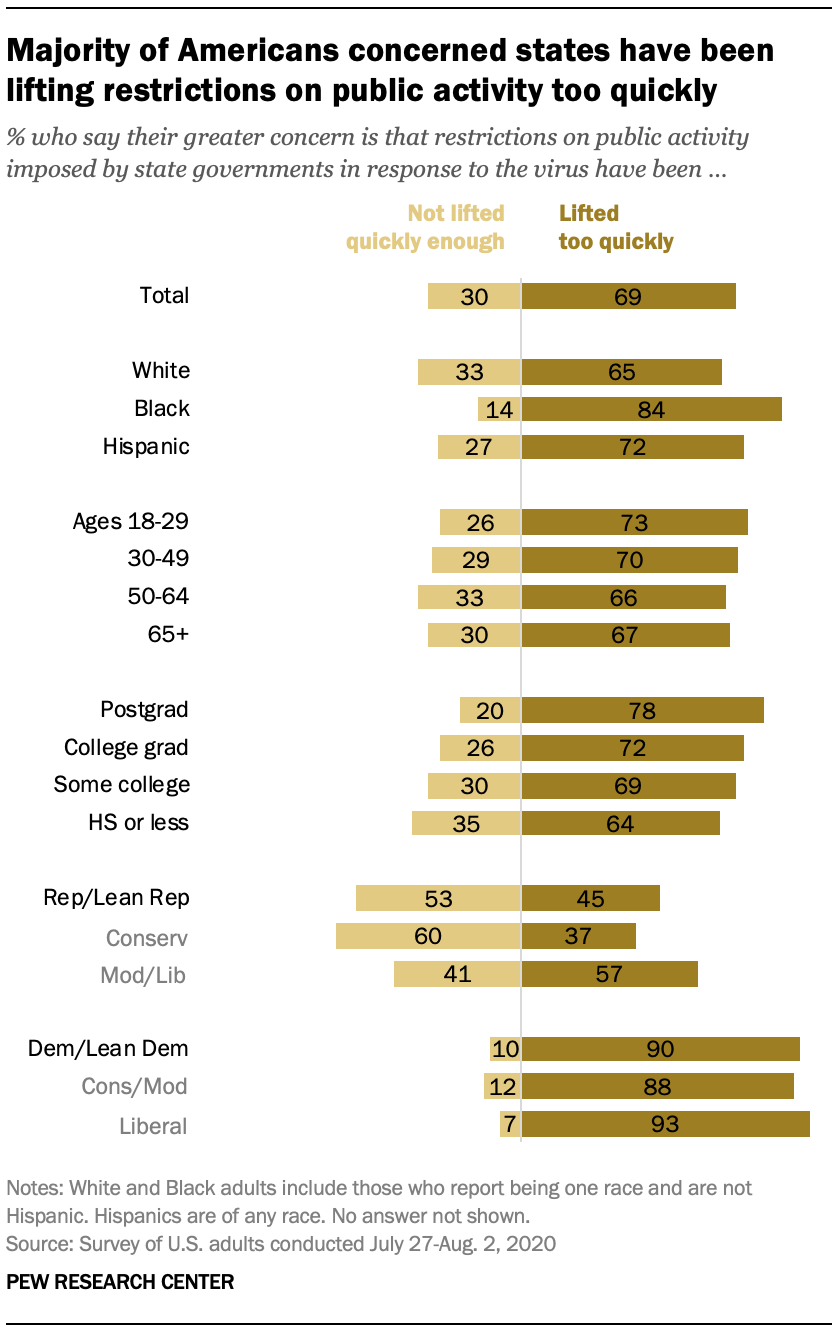
With most states having eased restrictions since the early months of the outbreak, nearly seven-in-ten Americans (69%) say they are more concerned that state governments have been lifting restrictions on public activity too quickly; 30% express more concerns that these restrictions have not been lifted quickly enough. This balance of opinion is similar to the public’s concerns in May, when many states were still under stay-at-home orders, about what states would do.
While majorities in most groups say they are concerned that states have been opening up too quickly, there are differences by race and ethnicity, educational status, and partisan affiliation.
About eight-in-ten Black adults (84%) and seven-in-ten Hispanic adults (72%) are more concerned states have been lifting restrictions too quickly. A narrower majority of white adults – still nearly two-thirds (65%) – also express this view.
Overall, adults with higher levels of education are more likely than those with less education to say they are concerned about state governments lifting restrictions too quickly. For example, 78% of adults with a postgraduate degree say they are concerned restrictions are being eased too quickly, compared with 64% adults with a high school diploma or less education.
Republicans are relatively divided on this question, though somewhat more say their greater concern is that restrictions have not been lifted quickly enough (53%) rather than that they have been lifted too quickly (45%). While six-in-ten conservative Republicans say their concern is that state restrictions are not being lifted quickly enough, a similar share of moderate and liberal Republicans (57%) express more concern that restrictions have been lifted too quickly.
Overwhelming shares of both liberal Democrats (93%) and conservative and moderate Democrats (88%) say they are more concerned that state restrictions on public activity have been lifted too quickly.
What is the most effective way to an economic recovery?
Nearly three-quarters of Americans think that the most effective way to fix the U.S. economy is by reducing coronavirus infections to a level where people feel comfortable returning to stores, schools, restaurants and other workplaces. About a quarter (26%) say the more effective path to economic recovery is by opening up more of these workplaces and businesses even if infections have not yet been reduced.
Democrats overwhelmingly say that the best way for the economy to recover is to reduce the number of coronavirus infections so that the public feels comfortable going to businesses (94% say this).
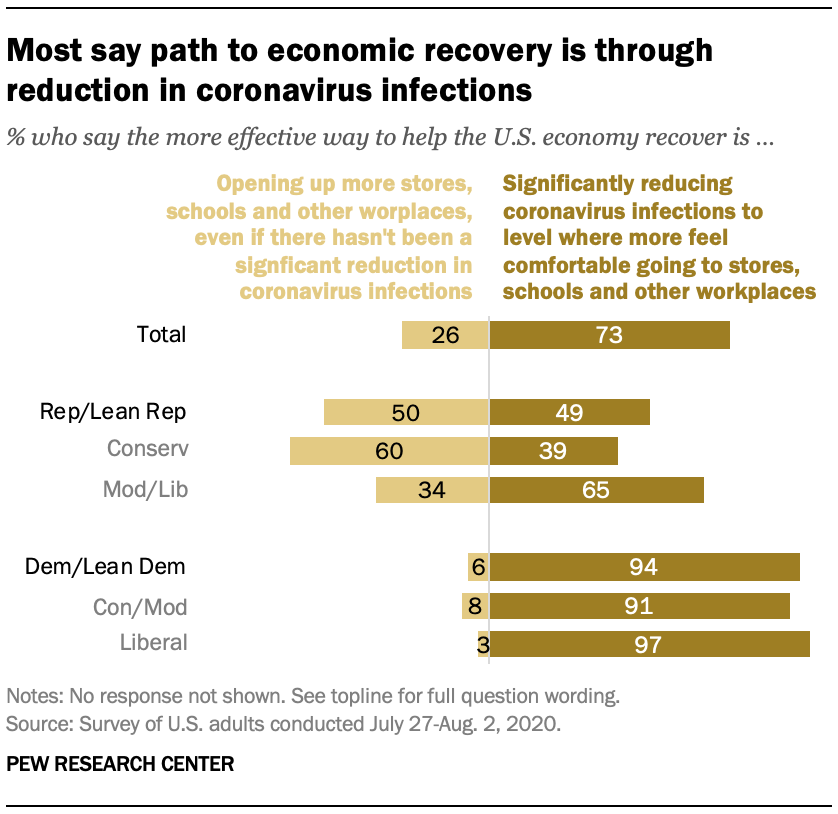
GOP views are divided: 50% say the more effective path to recovery is by opening up more businesses and workplaces even if infections haven’t been reduced, while about as many (49%) say reducing cases so people feel comfortable going to these places is the more effective path.
About two-thirds of moderate and liberal Republicans (65%) say that reducing coronavirus cases to the point where people are comfortable engaging in in-person work and other economic activity is the more effective path to U.S. economic recovery. By contrast, six-in-ten conservative Republicans say opening up businesses and other workplaces, even if there hasn’t been a reduction in coronavirus infections, is the most effective way to economic recovery.
Public gives the country’s handling of the pandemic negative marks
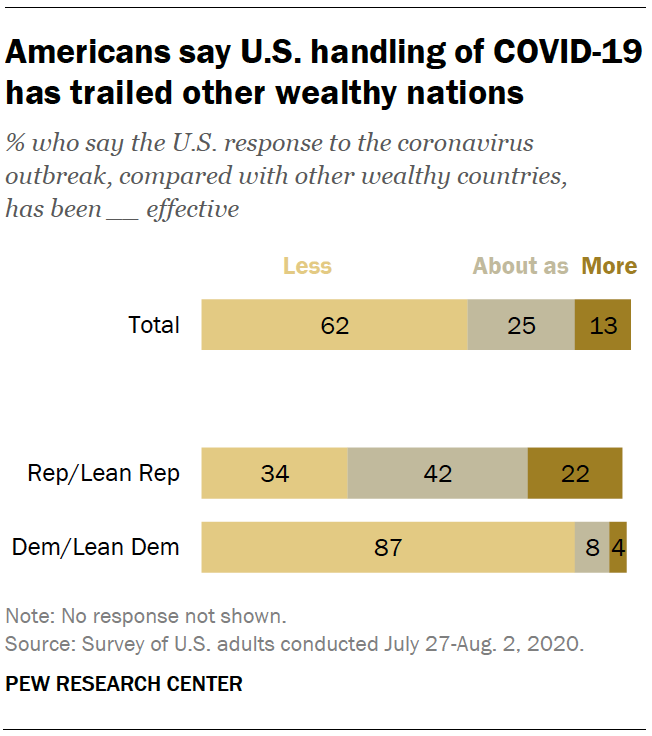
A majority of Americans say the nation’s response to the pandemic compares poorly to how other affluent countries have responded: 62% say the U.S. has been less effective than other wealthy countries in responding to the coronavirus outbreak, a quarter say the U.S. response has been about as effective as these other nations and just 13% of Americans say the U.S. response has been more effective than that of other wealthy countries.
Democrats overwhelmingly say the U.S. has lagged behind other wealthy countries in its response, with 87% saying the nation’s response has been less effective.
Only about a third of Republicans (34%) say the U.S. response has been a less effective than that of other wealthy countries, with a plurality of Republicans saying that the nation’s response has been about as effective as these other countries. About a quarter of Republicans (22%) say the U.S. response has been more effective than that of other wealthy nations.
Partisan divides on COVID-19 attitudes far greater than differences linked to local health impact
As has been the case throughout the coronavirus outbreak, partisan divides in opinions about the pandemic and policies to address it continue to be far wider than the differences in opinion between those who live in the places of the country where the health impacts have been higher and those who live in places that have seen less of an impact.
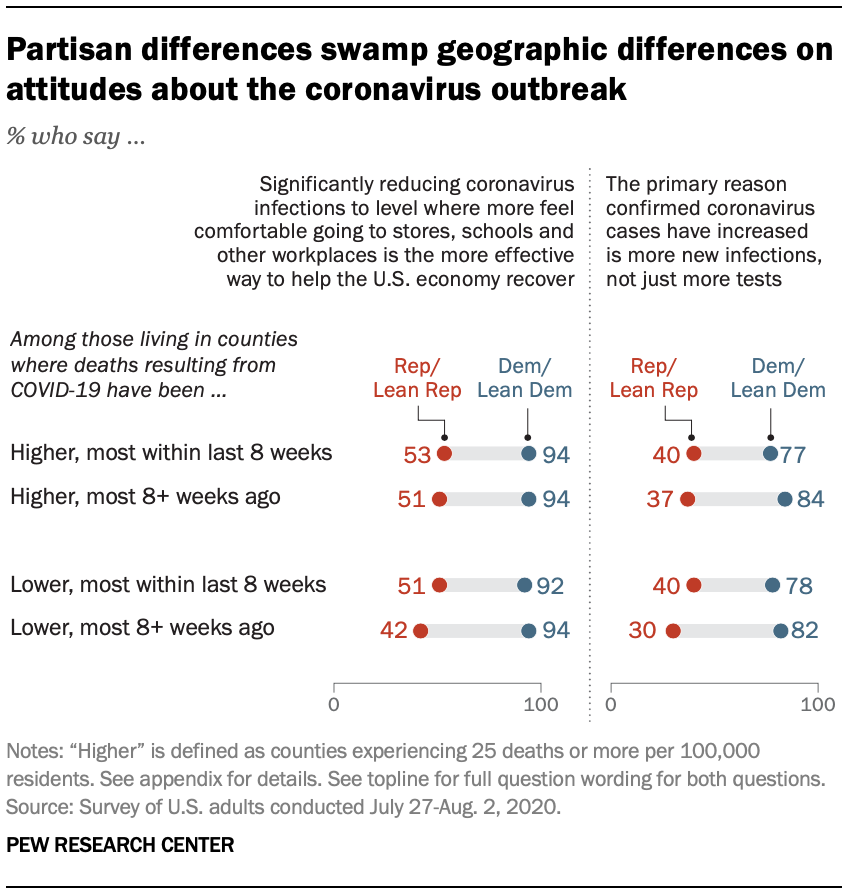
For instance, Republicans and Republican leaners living in places that have relatively low death rates and have not seen new deaths rise in recent months are 10 percentage points less likely than Republicans who live in other parts of the country to say that the most effective way forward for the nation’s economy is to reduce infection rates so that people feel comfortable going to stores, restaurants, schools and other workplaces (42% compared with 52%). This geographic difference is far more modest than the differences between Republicans and Democrats in those same areas.
Similarly, when asked about whether the recent increases in reported cases of the coronavirus is mainly the result of growing infections or an increase in testing, Republicans living in these less hard-hit parts of the country are slightly less likely than those living in other areas to say that the increase in cases is due to more infections rather than just more testing (30% compared with 39%). But again, these small geographic differences are overshadowed by partisan differences – at least three-quarters of Democrats, regardless of the COVID-19 impact in their area – attribute the rise in confirmed cases more to rising infections.
CORRECTION (Aug. 6, 2020): In the chart “Americans say U.S. handling of COVID-19 has trailed other wealthy nations,” the “Rep/Lean Rep” column has been edited to correct the “% who say the U.S. response to the coronavirus outbreak, compared with other wealthy countries, has been more effective” to 22%. The following sentence was also updated to reflect this, “About a quarter of Republicans (22%) say the U.S. response has been more effective than that of other wealthy nations.”
The changes did not affect the report’s substantive findings.
